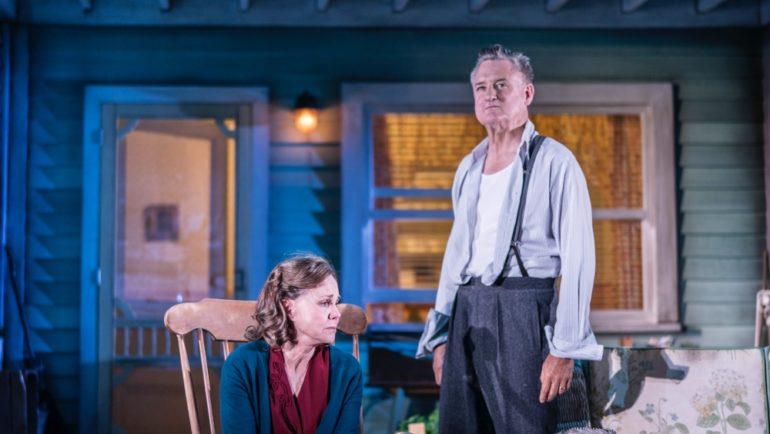London Theater Review: ‘All My Sons’ With Sally Field, Bill Pullman
By Matt Trueman
LOS ANGELES (Variety.com) – If “All My Sons” is showing its age, it sure shows no signs of abating. Just days after a major revival opened on Broadway , moving Annette Bening and Tracy Letts into the Tony zone, up the play pops in London. The Old Vic has arguably secured the starrier cast, too: Bill Pullman and play the Kellers as a couple coming apart from the start. But Arthur Miller plays differently away from home, and, in stretching to say something of national significance, Jeremy Herrin’s staging forgets to cover up the play’s cracks. It should hit like a hurricane, but here it’s hard work: all huff and puff.
Written in 1947, Miller’s play was both timeless and of its own time. Scarcely two years after WWII, it turned an all-too-familiar situation — a family riven by recent grief — into a classical tragedy. Just as Oedipus was doomed to bed down with his mum, so Joe Keller’s culpability is bound to catch up with him. Having shipped defective hardware to the U.S. armed forces, causing the deaths of 21 airmen, he watches his wife Kate hold out hope for their own pilot son, missing in action but never declared dead. Their fate is pretty much prefigured from the start and, as the situation slowly unfurls, it should bear down on Joe like an unstoppable force. Miller, effectively, dropped an Aristotelean bombshell into modern America.
Herrin, however, turns to another sort of timelessness. Flickering into life with a film of a flag flapping in the breeze, stars and stripes rippling against a summery sky, his production asks whether America has significantly changed in the 72 years since. Duncan McLean’s ghostly opening sequence channel-hops from retro home movies on well-cut lawns to drive-by panning shots of fresh green trees and recently built wooden homes. It sets up this suburban lifestyle as something steadfast and stubborn: an enduring American dream, the same today as it was post-WWII. The target, then, is conservatism, even nostalgia and, in a neat trick, the Keller’s family home materializes out of the film like a memory or a mirage — the image of Middle America made flesh.
It is, in Max Jones’ design, almost too picture perfect. A white picket fence runs round a lush little garden. Four healthy poplars stand straight as soldiers and an old wicker sofa stretches out on the lawn. It is also, somehow, just a little off, a tad too contemporary to be entirely credible. The turquoise exterior is just a bit too tasteful; the planting is almost postmodern in its avoidance of anything too trim and twee. As for Joe Keller, he could equally blend in today. With his grey checked shirt open and an unruffled air, Pullman plays him casual as a Californian — hands in his pockets, a smile on his lips; all that’s missing is a beer in his hand. He’s a long way from the old-school patriarch, but something of this “man among men” persists.
That timelessness tunes you into the text anew. You clock every mention of how little has changed since the war and spot the way the family home is portrayed as a jail — the white blinds in its windows half-open like bars. Mostly, though, you see a self-replicating social order; the way one generation morphs, slowly, into the last. Colin Morgan captures the servility of survivor’s guilt as the Keller’s second son Chris, letting his voice drop as his initial idealism gives way to his father’s pragmatism, while Jenna Coleman’s breezy Ann loses her sunny demeanor to become as old-fashioned as Field’s Kate. Their inceptive relationship is stilted enough to suggest more determination to start a family than desire.
Everything’s surface, and Pullman plays Joe as a man putting on a show too: his laid-back bonhomie concealing the guilt below. If he opens up his backyard and jokes with his neighbors, it’s more about maintaining social standing and, with it, success, than the other way around — enjoying the fruits with real friends. He seems to have gotten smaller, too, hiding behind humor as if he’s aware it could all so easily come crashing down. When he dresses for dinner, he scrubs up to look presidential, but the thing about keeping up appearances is that a façade maintained can never mutate. This “man among men” becomes a model.
As Kate, Field is frayed from the beginning. As the play goes on, she seems to malfunction beneath the pressure to put on a public face without finding time to grieve. At times, Field just seems to judder. It is, in fact, an uncharacteristically overblown performance, especially opposite Pullman’s shambling, semi-mumbling turn.
It still resembles every “” ever staged, though: a show in search of something substantially new to say and never quite bold enough to throw off its shape. Herrin’s production feels fresh from a factory line, albeit as defective as one of Joe Keller’s cracked cylinders. Miller’s play is so full of clunks and contrivances that it needs scuffing up. Too much here is too traditional: carefully blocked, lines on the beat, emotionally emphatic. For whatever reason, it just doesn’t quite fly.

